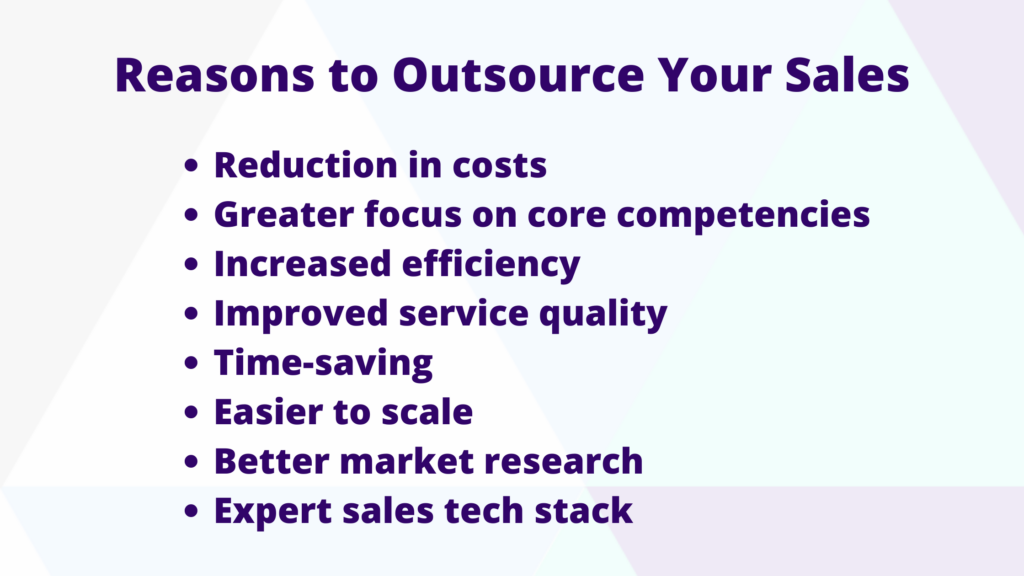Hiring for sales positions isn’t as easy as you might think. Many organizations are stuck in a cycle of high turnover and subpar performance, only occasionally discovering top talent.
The Bureau of Labor Statistics forecasts the labor shortage to heighten in the years ahead. In the BLS’ Employment Projections Report, the US economy plans to add 11.9M jobs by 2030 but the workforce will only grow by 8.9M. An increase in unfilled jobs by 2030 will be great news for sales professionals. Unfortunately, this can also be seen as troubling news for employers trying to build their sales teams.
Outsourcing Trends in Sales Positions
A Gartner survey highlights that sales reps have about 5% of a customer’s time during their B2B buying journey. At the same time, the number of people involved in a B2B purchase has grown from 5 to 11. All these factors have not only added to the complexity of B2B buying but have also increased the length of the purchase cycle.
It’s safe to say that the work being done by sales professionals is becoming increasingly difficult and complex to manage. And while it’s tempting to complete every task in-house, when you focus your time and resources on one initiative, you may lose focus on other priorities.
Competition is at an all-time high with dynamic markets and surging advances in technology changing the way companies work. In order to stay competitive, growth leaders must leverage available resources and technology at a global level in a highly efficient and effective manner. With these evolving trends, sales outsourcing is helping companies reach their sales goals with its multifunctional purpose.
The outsourcing industry has become one of the fastest-growing sectors in the global business ecosystem. Today’s outsourcing market is fast-paced, adapting to the global challenges of the times like the Covid-19 pandemic, climate change, worldwide political and economic power shift, and other challenges that organizations have to deal with.
We all know the reasons why companies normally choose to outsource…

… But what are some of the current outsourcing trends in the sales industry?
Greater demand for building global teams:
The COVID pandemic has created a greater demand for global teams. As countries closed their borders during the height of the pandemic, companies faced challenges that required them to become agile. As a result, businesses worldwide had to outsource to accommodate all of their customers and sustain their operations. This strategy is expected to play a bigger role as a geographically dispersed workforce is known to offer greater support and functional expertise.
Enhanced focus on strategic partnerships:
With an enhanced focus on partnerships, outsourcing teams are no longer seen as a third party but as an extension of your internal sales team. Outsourcing partners are now being included in other decision-making processes while giving support services for non-core business functions and operations, such as risk assessment and strategic planning, among others.
Need for greater cybersecurity:
Companies working with sensitive data need to have strong data security and compliance. This holds especially in the current situation where the pandemic has brought an upsurge in cybercrime by up to 600%. Because of this, strong cybersecurity has become necessary to protect business data and applications from fraud such as identity theft and phishing scams. Outsourcing companies that follow compliance guidelines are the most secure, adopting the use of multi-level security and authentications to prevent stolen data.
Demand for better technology and tools:
The sales industry has shown an increased demand for cloud-based technology, along with the need for better prospecting and lead generation tools. Predictions show this trend will carry on this 2022, as companies continue to derive advantages from their outsourced sales tech stack.
For transparent outsourcing partners, applications (both bought and proprietary) help connect internal sales teams in real time. This means more sales goals are being met and better partnerships are being built across the board.
Greater industry specialization:
As the sales industry introduces more technology, it can be a challenge to master every single part of your sales process. More than ever, companies are gravitating toward multiple outsourcing partners within their specialties, gaining knowledge and profit from bringing those groups together to make more informed business decisions.
Companies must evolve and adapt to the hiring challenges brought by the present times. Because of this, numerous outsourcing developments continue to emerge, reflecting global shifts. By staying updated with these latest developments, you can get deeper insights into managing your resources.







